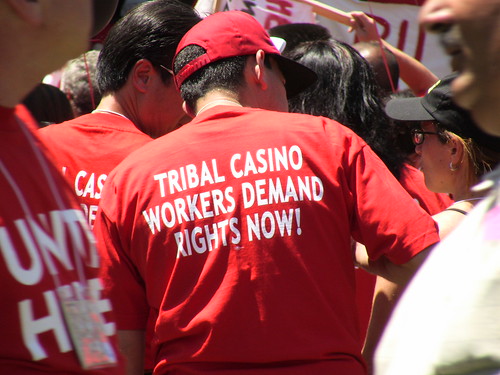(cross-posted from Working Californians also up at Daily Kos)
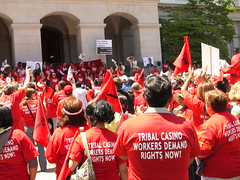 The voices of the casino workers were heard within the Capitol today. Hundreds of red-shirted workers gathered on the North steps for a rally and then marched inside in an orderly fashion to do some lobbying. The event culminated as over two hundred UNITE-HERE members chanted from the second story of the rotunda “¡Si, Se Puede!” just steps from the office of Speaker Fabian Nunez. The dome amplified the chants as staffers poked their heads out of their office doors and the CHP scrambled to ensure the direct action did not get out of control.
The voices of the casino workers were heard within the Capitol today. Hundreds of red-shirted workers gathered on the North steps for a rally and then marched inside in an orderly fashion to do some lobbying. The event culminated as over two hundred UNITE-HERE members chanted from the second story of the rotunda “¡Si, Se Puede!” just steps from the office of Speaker Fabian Nunez. The dome amplified the chants as staffers poked their heads out of their office doors and the CHP scrambled to ensure the direct action did not get out of control.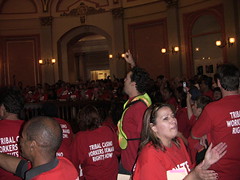
The events today were the last big push by the workers to ensure that workers rights were included in the Indian gaming compacts that the legislature is about to vote on. At issue are the basic workers rights protections that workers have under California law. In particular, the right to use check cards to indicate the desire of workers to form a union.
It is that exact right that is actually being heard in the U.S. Senate ironically today, as part of the Employee Free Choice Act. The Democratic leadership here in the state legislature has been indicating that they are siding with the tribes on the establishment of right to work colonies in the casinos. Dozens of labor leaders, including Working Californians’ co-chairs Marvin Kropke and Brian D’Arcy signed on to a letter to Senator Perata and Speaker Nunez recently. Here is an excerpt from that letter:
In contrast to most previous compacts submitted by the Governor in 2004, this compact—and presumably others to come—removes from the Tribal Labor Relations Ordinance the right for tribal casino workers (who are virtually all not tribal members) to freely choose whether they want unionization through card check, and to establish a level playing eld for their pursuit of decent wages, benets and working conditions. Instead, the Governor has reverted to the 1999 procedures for unionization, even though Speaker Núñez and Senate Majority Leader Gloria Romero conducted a detailed study of those procedures and found them severely decient and ineffective.
The U.S. House of Representatives, led by California’s own Nancy Pelosi and George Miller, with the support of every California House Democrat, recently voted to approve the card check procedure of organizing as a reform of the National Labor Relations Act. A super majority of California Assembly and Senate Democrats signed a letter of support for that legislation. Unfortunately, even if this effort should succeed, the enforceable jurisdiction of national labor law will not be settled law at tribal casinos for many years to come, if ever. In contrast, the card check procedure of organizing has become the standard in commercial gaming, and many tribal casinos, throughout our country and Canada. It would be ironic in the extreme for the California legislature, led by Democrats, to reject card check at the same time that California’s congressional delegation is leading the way on the same issue.
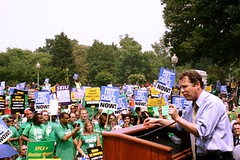
It is doubly ironic that the day of the rally is the day as debate begun on S. 1041 (EFCA). Indeed thousands of fellow brothers and sisters gathered on the National Mall today as Senate Majority Leader Harry Reid and Senators Dick Durbin, Edward M. Kennedy, Hillary Clinton, Sherrod Brown, Bernie Sanders spoke to the crowd about the importance of passing the Employee Free Choice Act. (photo of Sen. Brown speaking from democrats.senate.gov)
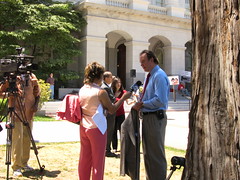
Meanwhile, I watched AFL-CIO Labor Fedration head Art Pulaski work hard today to explain to Nanette Mirada of ABC 7 why secrete ballot elections are not fair in practice. It is clear that there is a real lack of education on the issue. He used the example of the tribes scheduling several “educational” meetings on unionization, or deliberately making security guards fill out their ballots under video cameras and other intimidation tactics. He also patiently explained that workers do not have access to workers compensation and other benefits since they are working on the reservation.
Pulaski also went into the politics of the fight and vaguely threatened the Democratic leadership. Pulaski referred to the gathered workers as the “ground troops” for the election, noting that they would not be particularly motivated in upcoming elections if they lost this battle now. “Money talks inside the capitol…and the odds are stacked against these workers” he said, referring to the large amount of donations the legislators have received from the gaming tribes.
More from the letter:
It is incomprehensible how California, in a period when the state is relying more and more on service sector jobs for economic development, could enact compacts which will create the largest expansion of gaming in American history with no clear path to the middle class for a work force eclipsing 60,000 workers, soon to be 100,000 workers, who are the engine behind this extraordinarily lucrative industry.
All the workers want is that the new compacts include the same rights as the 2004 Compacts did, nothing more. Already, 5,000 tribal gaming employees have chosen unionization. That choice has improved their lives and communities and simultaneously relived the Californian taxpayers of the burden of their health care costs and other social services for the working poor. If the Democratic Congress can support these basic rights, so should the Democratic State Legislature in California.
More pictures in my flickr set.
